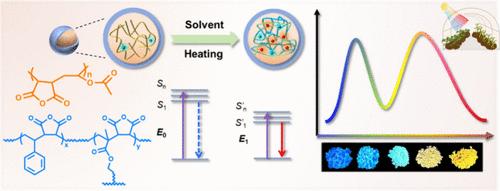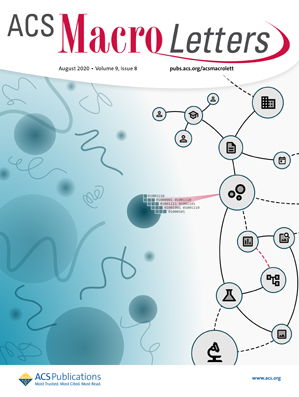Core–Shell Confined Stable Polymer Nanoparticles with Tunable Clusteroluminescence
IF 5.1
Q1 POLYMER SCIENCE
引用次数: 0
Abstract
Clusteroluminescent polymers have the most potential to be used in light conversion agricultural films due to tunable emission wavelength and large-scale production, but they are still limited by shortcomings such as poor stability and sensitivity to melting processes. In this work, we propose a core–shell confined stable clusteroluminescent polymeric nanoparticle strategy with adjustable shell thickness. By the employment of a combination of solvent and heat treatment methods, the structures, rigid-flexible properties, and aggregation states of the core polymer chains have been modified. The presence of cross-linked shells has significantly enhanced the stability of the clusteroluminescent nanoparticles, ensuring that they retain their structure form even after undergoing high temperature and shear. Finally, the stable agricultural light conversion films with tunable clusteroluminescence are obtained via melt blending of the core–shell confined nanoparticles and polyethylene (PE). Due to the shell confinement effect, when melt-blended, the shell can protect the clusteroluminescent polymer within the core from the effects of high temperature and shear. It is anticipated that the completion of this work will provide a significant foundation for the large-scale application of cluster-luminescent polymers in agriculture.

具有可调簇状荧光的核壳致密稳定聚合物纳米粒子
簇状发光聚合物具有可调发射波长和大规模生产的特点,在光转换农膜中的应用潜力最大,但其稳定性差、对熔化过程敏感等缺点仍限制了其应用。在这项工作中,我们提出了一种壳厚度可调的核壳密闭稳定簇发光聚合物纳米粒子策略。通过结合使用溶剂和热处理方法,改变了核聚合物链的结构、刚柔特性和聚集状态。交联外壳的存在大大提高了聚簇发光纳米粒子的稳定性,确保它们在经历高温和剪切后仍能保持其结构形式。最后,通过将核壳限制纳米粒子和聚乙烯(PE)熔融混合,获得了具有可调聚簇发光的稳定农用光转换薄膜。由于壳的约束效应,在熔融混合时,壳可以保护核内的聚簇发光聚合物不受高温和剪切力的影响。预计这项工作的完成将为集束发光聚合物在农业领域的大规模应用奠定重要基础。
本文章由计算机程序翻译,如有差异,请以英文原文为准。
求助全文
约1分钟内获得全文
求助全文
来源期刊
CiteScore
10.40
自引率
3.40%
发文量
209
审稿时长
1 months
期刊介绍:
ACS Macro Letters publishes research in all areas of contemporary soft matter science in which macromolecules play a key role, including nanotechnology, self-assembly, supramolecular chemistry, biomaterials, energy generation and storage, and renewable/sustainable materials. Submissions to ACS Macro Letters should justify clearly the rapid disclosure of the key elements of the study. The scope of the journal includes high-impact research of broad interest in all areas of polymer science and engineering, including cross-disciplinary research that interfaces with polymer science.
With the launch of ACS Macro Letters, all Communications that were formerly published in Macromolecules and Biomacromolecules will be published as Letters in ACS Macro Letters.

 求助内容:
求助内容: 应助结果提醒方式:
应助结果提醒方式:


